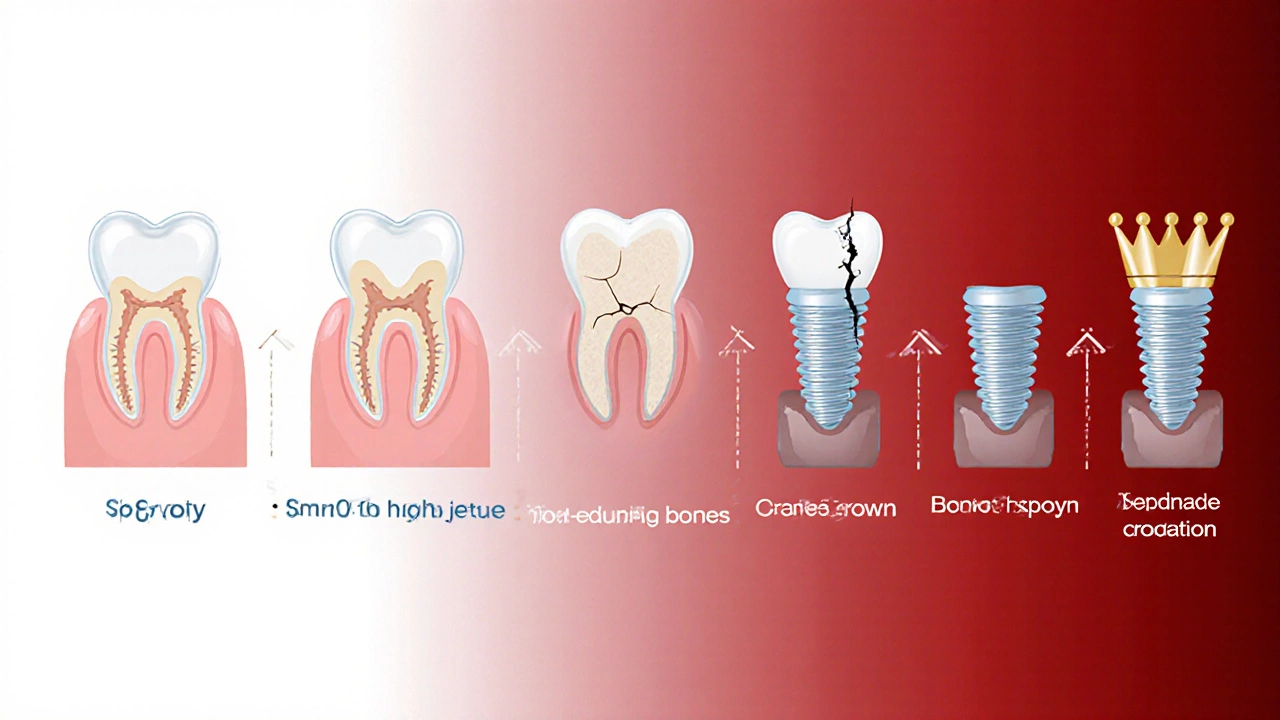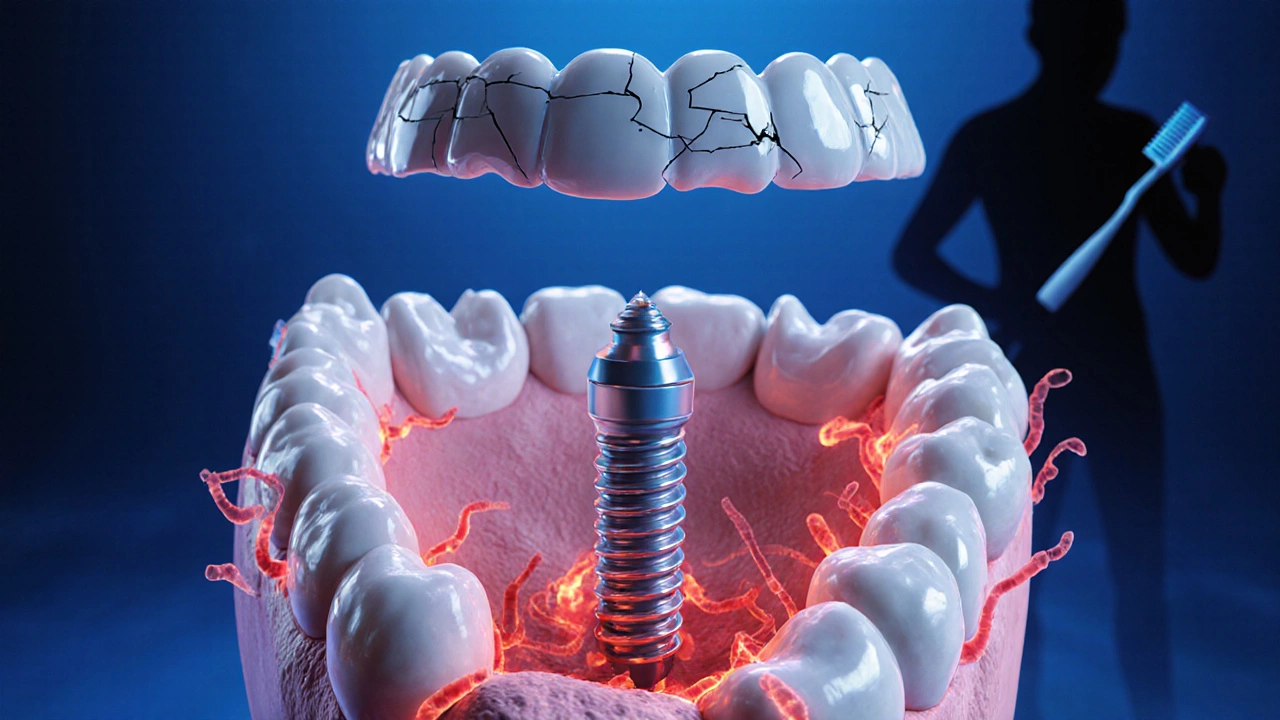Dental Implant Cost Calculator
Cost Estimator
Results & Insights
Base implant cost:
Crown cost:
Bone graft cost:
Total before insurance:
Insurance coverage:
Out-of-pocket cost:
Important notes:
Enter your details to see estimated costs and risk factors
Most people hear about dental implants and think they’re the gold standard-strong, permanent, and natural-looking. And for many, they are. But here’s the truth no one tells you upfront: dental implants aren’t perfect. They come with real risks, hidden costs, and situations where they can go wrong-sometimes badly. If you’re considering implants, you need to know what could go wrong before you say yes.
They’re Expensive-And Insurance Rarely Covers It
A single dental implant in India can cost anywhere from ₹25,000 to ₹60,000. Add a crown, and you’re looking at ₹40,000 to ₹80,000 per tooth. If you need multiple implants or bone grafting, the bill can easily cross ₹3 lakh. Compare that to a removable partial denture, which might cost ₹5,000-₹15,000. Even a fixed bridge runs half the price of implants.
Most health insurance plans in India don’t cover implants. They classify them as cosmetic or elective. Even if you have a premium plan, you’ll likely pay out of pocket. That’s why many people delay treatment-until the problem gets worse. And when you finally get implants, you’re locked into the cost. Unlike dentures, you can’t return them if you regret it.
Failure Is More Common Than You Think
Success rates for dental implants are often quoted as 95%. That sounds great-until you realize that means 1 in 20 implants fail. Failure doesn’t always mean the implant falls out right away. Sometimes, it happens slowly. Bone doesn’t fuse properly. The implant becomes loose. You feel a dull ache. Then, months later, you need surgery to remove it.
Smokers have a failure rate up to 20%. Diabetics with poor blood sugar control? Up to 15%. People with gum disease who didn’t get it treated before implant placement? Risk jumps dramatically. A 2023 study in the Journal of Clinical Periodontology found that untreated periodontitis increased implant failure risk by 3.2 times.
And if the implant fails, you don’t just lose the tooth. You lose bone. You lose money. And you lose time. Replacing a failed implant often requires a bone graft first-which adds another ₹30,000-₹70,000 and 6 months of healing.
It’s Not a Quick Fix-Recovery Takes Months
People think implants are like getting a filling. They’re not. The process takes 4 to 9 months. After the implant is placed, your jawbone needs to heal around it. That’s called osseointegration. You can’t rush it.
For the first week, you’ll be on soft foods. Swelling, bruising, and mild pain are normal. But after that, you’re stuck with a temporary denture or nothing at all while you wait. No chewing on that side. No biting into an apple. No laughing loudly without worrying about the implant shifting.
And if you have thin bone or lost bone from long-term tooth loss, you’ll need a bone graft. That adds 3-6 months. Some patients end up waiting over a year before they get their final crown. That’s a long time to live with a gap.

Complications Can Be Serious-And Hard to Fix
Most complications are minor: swelling, infection, minor bleeding. But some aren’t.
Implants placed too close to the sinus cavity can cause chronic sinus infections. In the lower jaw, they can damage the nerve that controls feeling in your lip, chin, or tongue. That numbness can be permanent. One patient in Pune I spoke to lost sensation in half his lower lip after an implant procedure. It’s been 18 months. No improvement.
Overloading the implant-biting too hard, grinding teeth at night-can cause it to crack or break. Ceramic crowns chip. Titanium screws loosen. If the implant breaks inside the bone, removal becomes a surgical nightmare. You might need a specialist with a CT scan and microsurgical tools.
And then there’s peri-implantitis. It’s like gum disease, but around the implant. It eats away bone. It’s hard to treat. Antibiotics rarely fix it. You need deep cleaning, laser therapy, sometimes bone grafts. And even then, it often comes back.
Not Everyone Is a Good Candidate
Just because you want implants doesn’t mean you’re eligible. Age isn’t the issue-it’s health. If you have uncontrolled diabetes, autoimmune diseases, or are on bisphosphonate drugs (used for osteoporosis), your body may not heal properly. Chemotherapy patients? High risk. Heavy drinkers? Same.
Even if you’re healthy, your jawbone might not be strong enough. After years without teeth, the bone shrinks. You need a CT scan to check density. If it’s too thin, you can’t place an implant safely. Bone grafting helps-but it’s expensive, invasive, and still doesn’t guarantee success.
And if you grind your teeth at night? You might need a night guard. Otherwise, the constant pressure can crack the implant or crown. Many patients don’t realize this until it’s too late.
They Require Lifelong Care-Just Like Real Teeth
People think implants are maintenance-free. They’re not. You still need to brush twice a day. Floss daily. Use interdental brushes. Skip cleaning, and you get peri-implantitis. And unlike natural teeth, you can’t just get a root canal if something goes wrong. Once the implant fails, it’s gone.
Regular check-ups every 6 months are non-negotiable. If you miss them, problems sneak up. A small pocket of infection. A loose screw. A crack in the crown. Left unchecked, they turn into big, costly emergencies.
And if you move cities or change dentists? Finding someone who knows how to maintain implants isn’t easy. Many general dentists in smaller towns have never handled a failed implant case. You might end up traveling to a metro for help.

What Are the Alternatives?
Before you commit, consider other options:
- Dentures: Affordable, removable, easy to fix or replace. They take getting used to, but modern ones look natural.
- Fixed Bridges: Supported by adjacent teeth. Less expensive than implants. But you have to grind down healthy teeth to hold them in place.
- Removable Partial Dentures with Clasps: Good for multiple missing teeth. Less invasive. Can be adjusted as your mouth changes.
Each has trade-offs. But none require surgery. None carry the same risk of nerve damage. And most are far cheaper.
When Do Implants Make Sense?
Implants are worth it if:
- You’re healthy with good bone density
- You’re willing to spend the money and time
- You’re committed to lifelong oral hygiene
- You’ve lost one or two teeth and want the closest thing to natural
But if you’re on a tight budget, have chronic health issues, or hate dental visits? Save your money. Try a bridge or denture first. Don’t rush into surgery.
Dental implants aren’t magic. They’re medical devices. And like any device, they can break, fail, or cause harm. The key isn’t to avoid them entirely-it’s to understand what you’re signing up for.
Can dental implants fail years after placement?
Yes. While most implants last 15-25 years, failure can happen anytime-even 10 years later. Peri-implantitis, trauma, poor oral hygiene, or uncontrolled diabetes can cause bone loss around the implant, leading to looseness or complete failure. Regular check-ups are critical to catch early signs.
Is there an age limit for dental implants?
No strict age limit exists. People in their 70s and 80s get implants successfully. What matters is overall health, bone quality, and healing ability-not age. A healthy 80-year-old with good bone density is often a better candidate than a 40-year-old smoker with diabetes.
Do dental implants require special cleaning tools?
Yes. Regular toothbrushes aren’t enough. You need interdental brushes (small, cone-shaped brushes) to clean between the implant and gum. Water flossers help too. Avoid regular floss if it frays or gets stuck-it can trap bacteria. Your dentist should show you the right tools during your first follow-up.
Can you get dental implants if you have gum disease?
Only after it’s fully treated. Active gum disease must be controlled before implant placement. Otherwise, bacteria will attack the implant, leading to rapid failure. Treatment usually involves deep cleaning, antibiotics, and sometimes surgery. Waiting 3-6 months after treatment improves success rates significantly.
Are cheaper implants in India safe?
Some low-cost implants use inferior materials or lack proper certification. Look for implants approved by the Indian Council of Medical Research (ICMR) or those from brands like Straumann, Nobel Biocare, or MIS. Avoid clinics offering implants under ₹15,000 without clear brand details. You’re not just paying for the screw-you’re paying for quality control and long-term support.
What happens if an implant breaks?
If the crown cracks, it can usually be replaced. If the titanium implant itself fractures-which is rare-it requires surgical removal. This is complex because the implant is fused to bone. A specialist may need to use drills, piezoelectric tools, or even remove part of the jawbone to extract it. Recovery takes months. Prevention through proper bite management and avoiding hard foods is key.
What Should You Do Next?
Don’t rush. Get a second opinion. Ask for a CT scan to check your bone density. Ask your dentist: “What’s the failure rate for your implants?” “Do you handle complications?” “What’s your plan if it fails?”
Compare the total cost-including follow-ups, night guards, and potential bone grafts-not just the initial quote.
And remember: a missing tooth isn’t an emergency. A bad implant is. Take your time. Know the risks. Make an informed choice-not a rushed one.





